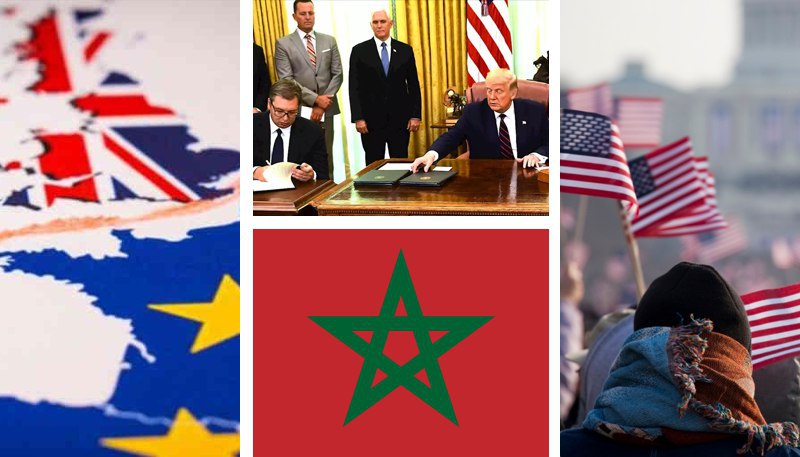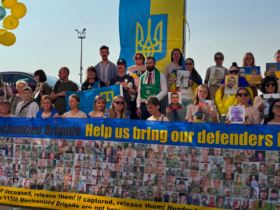Serbian and Kosovo leaders to Trump
Serbian President Aleksandar Vucic and Kosovo Prime Minister Avdullah Hoti signed an agreement on normalizing economic relations in Washington on September 4. The parties reached a number of agreements, although the clause of the mutual recognition of Belgrade and Pristina was not specified in the final version of the document. The signing took place in the Oval Office, where US President Donald Trump held a short meeting with Vucic and Hoti.
The agreement says Kosovo will join the regional customs union (“mini-Schengen”), which includes the free movement of goods, people, services and capital. The economic agreement was previously signed by the leaders of Serbia, Albania and northern Macedonia (in November 2019).
In addition, after signing the documents, Serbia guaranteed that it would stop pushing other countries’ away from recognizing Kosovo, while Kosovo agreed not to apply for membership in any international organizations for a year. In addition, the parties agreed on mutual recognition of higher education diplomas, and “as a sign of respect for the United States” recognized the status of Hezbollah as a terrorist organization.
But in addition to these issues, the agreement included a controversial decision to move the Serbian Embassy from Tel Aviv to Jerusalem, which has caused resentment in several other states. Trump specifically stressed the need to establish diplomatic relations between Israel and Kosovo.
The decision to transfer the embassy to Jerusalem was officially condemned by the League of Arab States and Turkey. The League stressed that such a step contradicts the UN resolutions and international law.
“We call on the leadership of Kosovo to abide by these [UN] decisions to refrain from such steps that would undermine the historical and legal status of Jerusalem and may also prevent Kosovo from being recognized by other states in the future,” the Turkish Foreign Ministry said in a statement.
The statement quoted various UN resolutions stressing that the Palestinian question can only be resolved through an independent, sovereign and geographically contiguous Palestinian state, with East Jerusalem as its capital, based on the pre-1967 borders.
I salute the signing of agreement b/w #Kosovo & #Serbia, today in Washington. Grateful to @WhiteHouse, @realDonaldTrump, and @RichardGrenell for their leadership in this process. Kosovo now will continue working on economic dev., jobs, and further domestic & int'l consolidation. pic.twitter.com/Xha4BU1pLg
— Hashim Thaçi (@HashimThaciRKS) September 4, 2020
Serbia’s foreign policy under Vucic is based on balancing between the East and West in an effort to preserve Russia’s protection while gaining American and European investments. The US has long sought to draw Belgrade into its geopolitical and economic orbit as part of its confrontation with Russia, while Kosovo is being played as a blackmail card. Russia competes with the US in the Balkans, so the Kosovo issue is not just a regional problem.
Therefore, it may be concluded in the context of the meeting that the decision on Jerusalem is only a courtesy towards the US, as a sign of relative loyalty and readiness to support Washington’s geopolitical interests.
Vucic is interested in American investments, on the one hand, and integration into the European Union on the other. The policy of balance may have worked for a long time, but it can not continue forever. The next step for Vucic if he wants EU membership would likely be the recognition of Kosovo, which most Serbs will not support. To soften a possible counter-reaction from Moscow, Vucic immediately talked about a meeting with the Russian side.
Libyan talks in Morocco
Five delegates from the Tripoli Government of National Accord and five of their opponents from Tobruk met in Morocco after the ceasefire was imposed. The meeting (referred to as the “Libyan Dialogue”), was held on Sunday at the initiative of Morocco, which hosted peace talks in 2015 that led to the establishment of the United Nations recognized government of Libya, beginning in the coastal town of Bouznika, south of Rabat.
The Moroccan talks are to be preceded by larger talks in Montreux, Switzerland, where representatives from the conflicting parties will also participate.
“The kingdom is ready to provide Libyans with a space to discuss [issues], according to their will, and will applaud them regardless of the outcome,” Moroccan Foreign Minister Nasser Bourita said.
The decision to resolve the Libyan crisis should be taken by the Libyans themselves under the auspices of the United Nations, he added.
Considering the important events in the Libyan arena, we should also highlight the meeting of Turkish President Recep Tayyip Erdogan with the head of the GNA Fayez al-Saraj. In the course of the talks, the leaders discussed the internal Libyan process after the declared truce and the violations of earlier agreements by Haftar’s regime. Erdogan and al-Saraj also discussed the visit of the Turkish delegation to Moscow and the Russian position on the Libyan issue in general. The talks also touched upon the issue of the demilitarized zone in Sirte and al-Jufra. The Turkish side also made it clear that it is against disagreements within the GNA in Tripoli, since only enemies of the government benefit from it.
Protests in the united states
This weekend, the United States spent 100 days protesting against police violence after the murder of George Floyd in Minneapolis. Large demonstrations took place in rural cities, as well as in major metropolitan areas in connection with new incidents of police brutality and racism.
Also this week, Jacob Blake, a black man who was shot in the back by a white police officer last month in Wisconsin, woke up from a state of unconsciousness, leading to a new wave of escalation. He gave his first speech from a hospital bed when racial justice and police duels continued to besiege U.S. cities.
As UWI wrote before, US society is being further divided into categories such “black” and “white”, “protesters” and “police”. The entire explosive social situation has heated up over the last few years (and especially during the COVID-19 pandemic), serving as a prelude to possible mass popular uprisings against the capitalist system that operates based on poverty, racism and artificial division. Only a mass movement of Americans of all colors can bring down the capitalist system, which can no longer justify bankruptcy, criminality and insecurity.
Deals after Brexit
British Prime Minister Boris Johnson announced the deadline for concluding a trade deal with the EU after Brexit – October 15. If the deal is not agreed, both parties must “accept it and move on,” he said.
On September 7, according to the plan, negotiations should resume. As Britain insists on full autonomy over government support and fisheries, negotiations have stalled. The parties note that if a deal is not reached, trade relations between Britain and the EU will continue. As an example, the model of the current agreement between the EU and Australia is cited.
Brexit was concluded on January 31, but a transition period will continue until the end of 2020.

















Leave a Reply